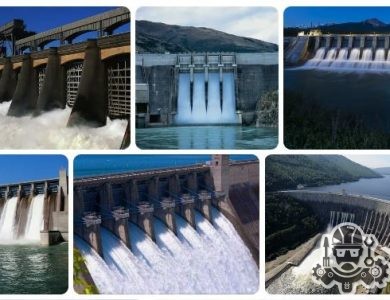What is Environmental Engineering? Salary & Jobs 2023

Environmental engineering is a branch of engineering that focuses on the application of scientific and engineering principles to address environmental issues and improve the quality of the environment. It involves the study and design of systems and processes to protect and manage natural resources, prevent pollution, and promote sustainable practices.
Contents
Environmental Engineering

Environmental engineers work to develop solutions for various environmental challenges, including air pollution control, water and wastewater treatment, solid waste management, contaminated site remediation, environmental impact assessment, and sustainable resource management. They aim to minimize the negative impact of human activities on the environment and promote sustainable development.
Some key areas of focus in environmental engineering include:
- Water and Wastewater Management: Environmental engineers design and implement systems for the treatment and distribution of clean water and the collection, treatment, and disposal of wastewater to ensure safe water supplies and protect water bodies from pollution.
- Air Pollution Control: Environmental engineers develop strategies and technologies to reduce air pollution and improve air quality, including the design and implementation of emissions control systems for industries and vehicles.
- Solid Waste Management: Environmental engineers work on the proper management of solid waste, including waste reduction, recycling, and safe disposal methods to minimize the impact on human health and the environment.
- Contaminated Site Remediation: Environmental engineers assess and remediate contaminated sites to mitigate the environmental and health risks associated with pollutants, including the cleanup of hazardous waste sites and the restoration of contaminated water and soil.
- Environmental Impact Assessment: Environmental engineers conduct assessments to evaluate the potential environmental impacts of proposed projects or activities, ensuring compliance with environmental regulations and minimizing negative effects.
- Sustainable Resource Management: Environmental engineers promote sustainable practices by developing renewable energy systems, optimizing resource use, and implementing eco-friendly technologies.
Environmental engineers work in collaboration with scientists, policymakers, and other professionals to develop and implement environmentally sustainable solutions. They use various tools and techniques such as modeling, data analysis, laboratory testing, and computer simulations to evaluate and design effective strategies for environmental protection and conservation.
Overall, environmental engineering plays a vital role in addressing environmental challenges and promoting sustainable development to safeguard the well-being of both present and future generations.
What does a Environmental Engineering do?
Environmental engineers are responsible for applying scientific and engineering principles to solve environmental challenges and improve the quality of the environment. Their work involves a wide range of tasks and responsibilities, including:
- Environmental Assessments: Conducting environmental impact assessments to evaluate the potential effects of proposed projects or activities on the environment. This includes assessing air quality, water resources, soil conditions, and ecological systems.
- Pollution Control and Prevention: Developing and implementing strategies to control and prevent pollution. This may involve designing and optimizing systems for air pollution control, wastewater treatment, and solid waste management.
- Water and Wastewater Management: Designing and overseeing the construction of water supply and wastewater treatment systems. This includes assessing water quality, designing treatment processes, and ensuring compliance with regulatory standards.
- Contaminated Site Remediation: Assessing and remediating contaminated sites, such as industrial facilities, brownfields, and landfills. Environmental engineers develop remediation plans, conduct soil and groundwater testing, and implement cleanup strategies to mitigate environmental and health risks.
- Sustainable Resource Management: Developing and implementing sustainable practices for resource management. This can include renewable energy systems, waste reduction and recycling programs, and promoting efficient use of resources.
- Environmental Policy and Compliance: Staying up-to-date with environmental regulations and policies and ensuring compliance with relevant standards. Environmental engineers may provide guidance on environmental regulations and help organizations adhere to legal requirements.
- Data Analysis and Modeling: Analyzing environmental data, conducting computer modeling, and using simulation tools to evaluate the potential impacts of different scenarios and predict environmental outcomes.
- Environmental Education and Public Outreach: Educating the public and stakeholders about environmental issues, sustainability practices, and promoting awareness of environmental protection. This can include organizing workshops, giving presentations, and engaging in community outreach activities.
- Research and Development: Conducting research to develop innovative solutions, technologies, and methods for environmental protection and sustainable development. Environmental engineers may contribute to scientific publications and collaborate with academic institutions or research organizations.
- Project Management: Managing environmental engineering projects, including planning, budgeting, resource allocation, and coordination of activities to ensure successful project execution.
Environmental engineers work in various settings, including government agencies, consulting firms, research institutions, and industries such as manufacturing, construction, and energy. They collaborate with multidisciplinary teams, including scientists, policymakers, architects, and other engineers, to address complex environmental challenges and promote sustainable practices.
What is Environmental Engineering Salary?

The salary of environmental engineers can vary depending on factors such as education, experience, location, industry, and the specific role or position held. Salaries can also differ between countries and regions.
In the United States, according to data from the U.S. Bureau of Labor Statistics (BLS) as of May 2020, the median annual wage for environmental engineers was around $92,120. The lowest 10 percent earned less than approximately $54,020, while the highest 10 percent earned upwards of $128,860.
It’s important to note that these figures are approximate and can vary based on individual circumstances and market conditions. Additionally, salaries may differ in other countries due to factors such as cost of living and economic conditions.
To get a more accurate and up-to-date understanding of the salary range for environmental engineers in a specific country or region, it is recommended to consult local salary surveys, job market reports, and professional engineering organizations. Additionally, researching job postings and discussing with professionals working in the field can provide valuable insights into the current salary trends for environmental engineering positions.
What is the Environmental Engineer Salary in Other Countries?
The blow table showcasing approximate salary ranges for environmental engineers in different countries. Please note that these figures are based on general market trends and can vary depending on factors such as experience, qualifications, industry, and location. Currency conversions are based on exchange rates at the time of writing and may fluctuate.
| Country | Salary Range (Approximate) |
|---|---|
| Canada | CAD 60,000 – CAD 100,000 |
| France | EUR 35,000 – EUR 70,000 |
| Spain | EUR 25,000 – EUR 50,000 |
| Germany | EUR 40,000 – EUR 70,000 |
| Japan | JPY 4,000,000 – JPY 8,000,000 |
| England | GBP 25,000 – GBP 50,000 |
| Turkey | TRY 50,000 – TRY 100,000 |
| Italy | EUR 30,000 – EUR 60,000 |
| Portugal | EUR 20,000 – EUR 40,000 |
| China | CNY 100,000 – CNY 200,000 |
These figures are meant to provide a general overview of the salary ranges and may vary based on individual factors and specific job roles within environmental engineering. It is always recommended to research local job markets, consult salary surveys, and consider the cost of living in each country when assessing potential salaries.
Environmental engineering is a branch of engineering that focuses on the application of scientific and engineering principles to address environmental issues and improve the quality of the environment. It involves the study and design of systems and processes to protect and manage natural resources, prevent pollution, and promote sustainable practices.
Environmental engineers are responsible for applying scientific and engineering principles to solve environmental challenges and improve the quality of the environment. Their work involves a wide range of tasks and responsibilities, including:
In the United States, according to data from the U.S. Bureau of Labor Statistics (BLS) as of May 2020, the median annual wage for environmental engineers was around $92,120. The lowest 10 percent earned less than approximately $54,020, while the highest 10 percent earned upwards of $128,860.



